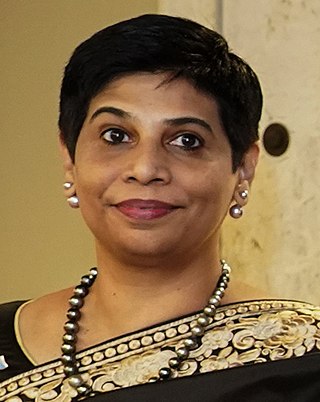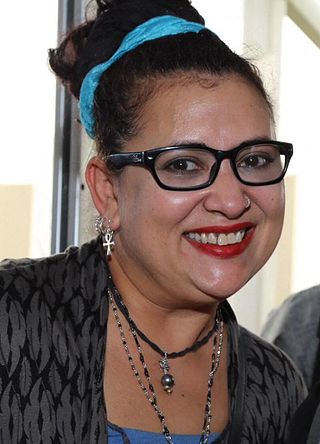
Josaia Voreqe "Frank" Bainimarama is a Fijian politician and former naval officer who served as the prime minister of Fiji from 2007 until 2022. A member of the FijiFirst party, which he founded in 2014, he began his career as an officer in the Fijian navy and commander of the Fijian military. He served as the opposition leader from 24 December 2022 despite being suspended from Parliament until 8 March 2023, when he resigned and was replaced by Inia Seruiratu.
Taniela (Daniel) Vafo'ou Fatiaki CF was the Chief Justice of Fiji from 1 August 2002, when he succeeded Sir Timoci Tuivaga, till 5 December 2008. As Chief Justice, he presided over both the High Court and the Supreme Court, but was constitutionally barred from presiding over, or even sitting on, the Appeal Court. On 3 January 2007, he was sent on leave by the Republic of Fiji Military Forces, which had seized power on 5 December 2006. On 19 January, he was formally suspended, pending an investigation into allegations of misconduct. This investigation was dropped in December 2008 as part of a deal that involved his formal resignation.

The Reconciliation and Unity Commission was a proposed government body to be set up if the Reconciliation, Tolerance, and Unity Bill, which was introduced into the Fijian Parliament on 4 May 2005 was passed. The legislation proposed to empower the Commission to grant amnesty to perpetrators of the Fiji coup of 2000, and compensation to victims of it from 19 May 2000 through 15 March 2001. The Fijian President would retain a veto over the granting of amnesty.
Akuila Yabaki is a Fijian human rights activist and Methodist clergyman. From 2002 to 2015 he was Executive Director of the Citizens Constitutional Forum, a pro-democracy organization.

The Fijian coup d'état of December 2006 was a coup d'état in Fiji carried out by Commodore Frank Bainimarama, Commander of the Republic of Fiji Military Forces (RFMF), against Prime Minister Laisenia Qarase and President Josefa Iloilo. It was the culmination of a political crisis that started the previous year, when the Qarase government introduced three bills to the Fijian Parliament. The Qoliqoli, Land Tribunal, and Reconciliation, Tolerance, and Unity Bills dealt with the ongoing ethnic conflicts in Fiji and the aftermath of the 2000 coup, and were considered to be pro-ethnic Fijian. Bainimarama presented the government with a list of demands on October 16 that included withdrawing the bills. Attempts at negotiation failed and the military launched the coup on 4 December. Parliament was dissolved, Qarase and his cabinet were dismissed, and some civilian officials were placed under house arrest. After the Great Council of Chiefs refused to appoint a cabinet friendly to the military, Bainimarama reached an understanding with Iloilo and reinstated him as President on 4 January 2007. Iloilo then appointed Bainimarama acting Prime Minister in charge of the Interim Cabinet.
Imrana Jalal, also known as Patricia Jalal is a Fijian lawyer and activist of Indian descent, born on June 3, 1960 in Suva, Fiji to Sayed Abdul Jalal and Rosemary Jalal. She served as a Human Rights Commissioner on the Fiji Human Rights Commission, and human rights advisor to the Pacific Regional Rights Resource Team and the United Nations United Nations Development Program and as a member of the Geneva-based International Commission of Jurists, to which she was elected in May 2006. She is a founding member of the Fiji Women's Rights Movement. She continues to sit on its Board as a non-residential Permanent Founding Member. She is associated with the international networks Women Living Under Muslim Law (Pakistan), and the Asia Pacific Forum for Women, Law and Development (Thailand). Jalal worked at the Asian Development Bank in Manila, Philippines for 7 years, as a Principal Social Development Specialist. Jalal was appointed to the Inspection Panel of the World Bank in January 2018 for a term of 5 years. She was made Chair of the Inspection Panel in December 2018 and will hold that position until June 2021, making her a Vice-President of the World Bank. Jalal is currently working full-time and is based in Washington, DC, USA at the World Bank HQ. The Inspection Panel is the World Bank's international accountability mechanism, receiving complaints against the Bank's projects and investments in the developing world.

Richard Naidu is an Indo-Fijian journalist, constitutional lawyer and opponent of the 2006 Fijian coup d'état. He is a former director of Transparency International Fiji.
Imraz Iqbal Ali is an Indo-Fijian human rights activist, journalist, and businessman. He does not normally use his last name, except for legal purposes. Together with Laisa Digitaki, he was the co-owner of a magazine, Fiji Living, based in Digitaki's home in the Lami suburb of Vugalei. Iqbal also hosted a popular Fiji Diving adventure show during his Television Career.
Shaista Shameem, a Fijian lawyer, the director of the Fiji Human Rights Commission (FHRC) from 2002 to 2007, and its director and chairperson from 2007 to 2009. A graduate of the University of the South Pacific, she holds a PhD in Sociology from the University of Waikato and a Masters in Law from the University of Auckland. She also holds a Doctorate in Juridical Science.

Nazhat Shameem is a Fijian diplomat and former judge serving as the Permanent Representative of Fiji to the United Nations since 2014. She was also the President of the United Nations Human Rights Council in 2021.
The Fiji Human Rights Commission (FHRC) was created by presidential decree in 2009, succeeding the entity of the same name established as an independent statutory body under the 1997 Constitution of the Republic of the Fiji Islands.
Lieutenant Colonel Pita Driti is a former Fijian soldier who played a prominent role in the 2006 Fijian coup d'état. He served as the Land Force Commander of the Republic of Fiji Military Forces, the third most senior position in the Military.
Rodney Acraman was Fiji's Acting Ombudsman and thus the ex officio Chairperson of the Fiji Human Rights Commission from 2006 to 2007, when he was replaced by Shaista Shameem. The Military administration, which took power in a coup d'état on 5 December 2006, appointed him to the Ombudsman's position on 13 December. Prior to his appointment, Acraman had worked for sixteen years in the Ombudsman's office. The position had been vacant since Walter Rigamoto had resigned earlier in the year to resume his private law practice.

Rear Admiral Viliame Naupoto is a Fijian soldier, politician and former Cabinet Minister. After serving as Commander of the Republic of Fiji Navy, he was appointed as a Minister in the military regime of dictator Frank Bainimarama. He was later appointed commander of the Republic of Fiji Military Forces, before being elected to the Parliament of Fiji in December 2022.
Angenette (Angie) Heffernan is a Fijian human rights and democracy activist and executive director of the Pacific Centre for Public Integrity (PCPI). Prior to PCPI she was a prominent regional environmental political campaigner for Greenpeace Australia for eight years, during which she campaigned against Japanese plutonium shipments in the South Pacific. She established the Pacific Centre for Public Integrity with Suliana Siwatibau and social justice campaigner Aisake Casimira to combat perceived corruption and bad governance in the Pacific region, She is known for her strong stance against political and state corruption and for her outspoken opposition to the 2006 Fijian coup d'état.

Sharon Bhagwan-Rolls is a Fijian political activist of Indian descent. She is the Technical Adviser of Shifting the Power Coalition, a humanitarian organization headed by Pacific women. She is also the former coordinator of the FemLINKPACIFIC, a women's media organization based in the capital of Suva, which she founded in September 2000 in response to the 2000 Fijian coup d'état. In addition to her numerous other functions, Rolls has served as the Media Focal Point for the Pacific Region of the Global Partnership for the Prevention of Armed Conflict was appointed the Gender Liaison of the International Steering Group of GPPAC in October 2009.
Ratu Rakuita Saurara Vakalalabure is a Fijian lawyer and former politician who served as Deputy Speaker of the House of Representatives of Fiji from 2001 to 2004. In August 2004 he was convicted of participation in the 2000 Fijian coup d'état and sentenced to six years' imprisonment. He was the son of Ratu Tevita Vakalalabure, who served in both houses of Parliament from the 1970s to the 1990s.

Fiji is an island nation in Melanesia in the South Pacific Ocean with a population of approximately 849,000. It is made up of Fijians, Indo-Fijians, Europeans, Chinese, other Pacific islanders, and people of mixed racial descent. Fiji has been in a state of political unrest since their independence from Britain in 1970.
Violence against women in Fiji is recognised to be "pervasive, widespread and a serious national issue" in the Pacific Island region. Fiji's rates of violence against women are "among the very highest in the world". The Fiji Women's Crisis Centre reports that 64% of women who have been in intimate relationships have experienced physical or sexual violence from their partner, including 61% who were physically attacked and 34% who were sexually abused.







